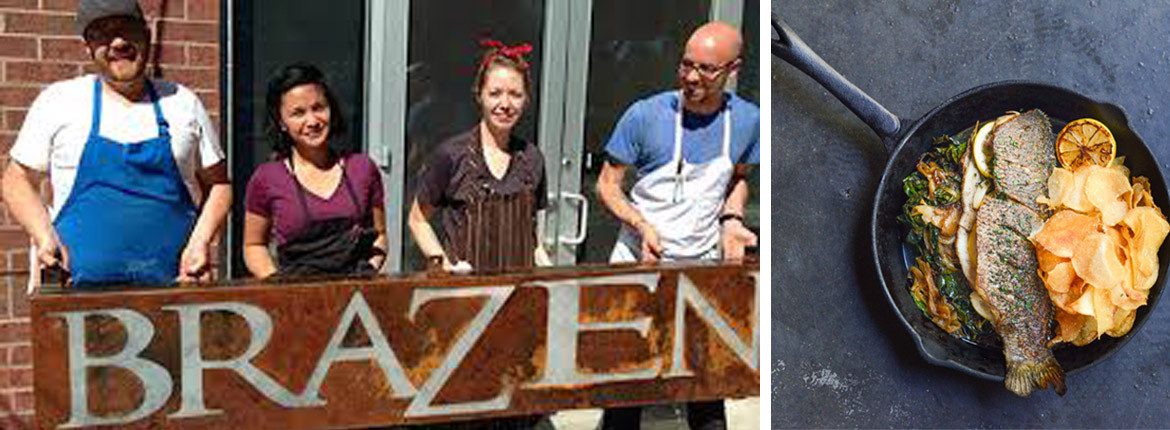Lance Barto, chef of Brazen, on the importance of hospitality and why freshwater fish deserves its day in the limelight
In late September, Lance Barto, whose notable cooking career has made an indelible mark on Denver’s dining scene, opened Brazen, a neighborhood restaurant in West Highland. He, along with his partner and front-of-house pro Chris Sargent, most recently of Acorn, beautifully transformed a former yogurt shop into a delightful neighborhood haunt that pulsates with infectious energy and ballyhoos an inspiring New American menu that features several ocean-intensive dishes, including oysters on the half shell, Bangs Island mussels floating in a white wine broth, ono crudo and roasted striped bass. Barto, who procures all of his seafood and fish from Seattle Fish Co., recently talked with us about how he landed in the restaurant business, the importance of hospitality and why freshwater fish deserves its day in the limelight.
I started working in the restaurant business when I was relatively young, around 16. I was bussing tables at Healthy Habits, a restaurant in Golden, and I was probably too young at the time to realize that I had an obsession and connection with both food and breaking bread with friends, family and the community. I actually got out of the industry, but then I was hard up for a job, and a close friend of mine got me a prep-cook gig. That was the beginning of my path towards becoming a chef.
I obviously love food, ingredients and cooking, but the thing I’m most passionate about is the truly human experience of providing hospitality to our guests. I talk with our staff constantly about widening our vision to ensure that we aren’t just feeding people, but genuinely connecting with them. We work really hard to provide happiness; it just so happens that food and beverages are our platform.
I’ve always had an interest in opening neighborhood restaurants, so when my now business partner Chris Sargent approached me three or four years about the idea of opening a neighborhood restaurant, I was intrigued about his ideas and also having the opportunity to work with such a strong FOH partner. After falling out of communication for a while, we reconnected when I was the chef at The Social in Castle Pines and needed some help. Chris stepped in, and when I saw him in action, I knew he was the operational partner that I’d been looking for. I wanted to do a neighborhood restaurant that emphasized quality but was still approachable, and Brazen, our new restaurant, has provided the perfect opportunity for us to achieve both. Chris and I also see eye-to-eye about what we want Brazen to be, and so far our vision has been successful.
Over the past several years of my career, I’ve continually worked on my ability to show restraint and execute simple food using good ingredients – and using them well – and Brazen is a good extension of that style of cooking. We’re not reinventing the wheel, or trying to win awards. Instead, we’re trying to provide our community with inspired, approachable cuisine. As a culinary team, and with Chris’s input, our menu is all about the food that we like to eat.
The upscale neighborhood restaurant boundaries are being reformatted throughout Denver, and it’s a vital step in our culinary development as a city. With each new restaurant I’ve opened, I’ve gotten closer to achieving the balance between providing what our guests are looking for and still pushing our personal culinary boundaries and development. I can’t express how much gratitude I have for all of the members of our staff who have helped to make my and Chris’s dreams a reality.
When it comes to cooking with fish, I’ll admit that I like all fish equally. That said, I’m particularly proud to be serving the Bangs Island mussels, and I appreciate the fact that I can use them with such a wide variety of flavor profiles and applications. Even so, we serve the most simple and straightforward mussels dish imaginable: white wine, lemon, garlic, butter, herbs and toasted bread. My philosophy is that if it’s not broken, there’s no need fix it.
Red-fleshed tuna is the most overused fish. I get it: It’s delicious. But our oceans are running empty of that fish, so stop eating it by the truckload. Eat Albacore instead; there’s plenty of that to be had. Thanks.
I don’t understand why more high-quality freshwater fish isn’t the focus of our region. I think that freshwater fish are not only delicious, but also have a wide variety of applications, plus they consistently bring a healthy approach of sustainability to the table.
Oysters are my favorite dish on our menu. We simply shuck them and serve them with lemon, mignonette and fresh horseradish. “To eat an oyster is to kiss the sea on the lips,” said Leonard Beck. He was right.
I first started working with Seattle Fish Co. when I was the chef at Central Bistro & Bar. I was looking to move on from my previous seafood purveyor to a company that was focusing more on sustainable fishing practices. I found Seattle Fish and was impressed with the catalog, plus I also respect the energy they spend on sourcing unique and sustainable products.
The best thing about working with Seattle Fish Co. is that it’s given me the opportunity to build some great relationships, plus they consistently source the best products they can for our guests. I also like the array of fresh products they sell; the quality is high and consistent.
Words of advice for people cooking fish at home: Disable the smoke detector! Properly searing and/or roasting fish requires an incredible amount of heat and smoking-hot oil. In addition, buy fish that’s been scaled, and always cook it with the skin on. Not only does that make the skin crisp and delicious, it also forms a physical barrier to help keep the flesh tender and juicy.

